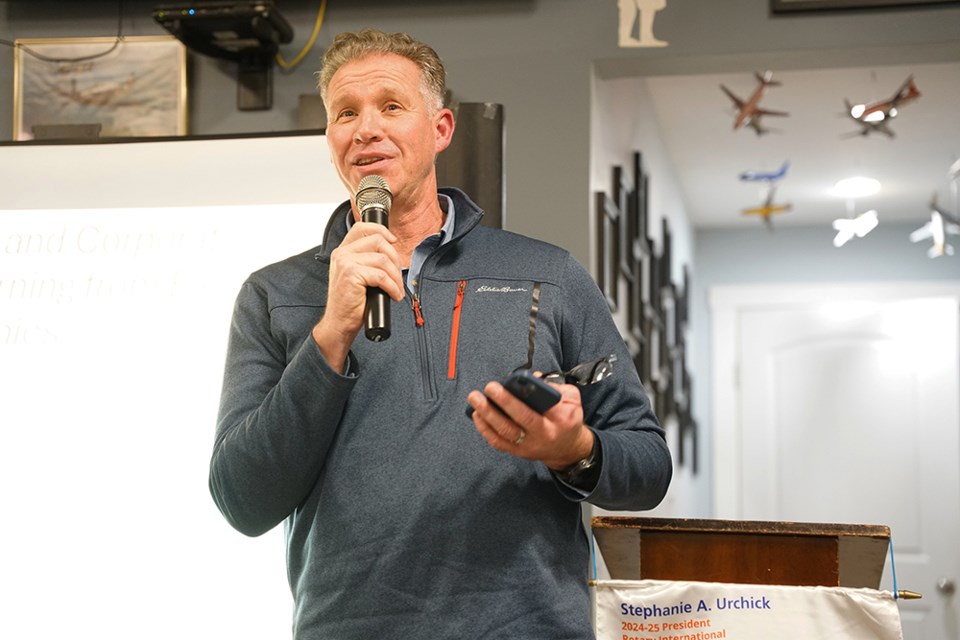Rotary Club of Powell River members were recently treated to an overview of the habits of wildlife, such as elephants, and the lessons that humans can learn from them.
Conservation expert David Powrie, now a qathet region resident, spoke at the January 15 meeting of Rotarians, sharing insights from his research on elephants in Africa, emphasizing their strategic behaviour, communication and family dynamics. He highlighted the importance of respect, trust and nurture for people in both corporate and family settings, drawing parallels to elephant behaviour.
Powrie has more than three decades of experience protecting natural resources and fostering community-led conservation initiatives. From managing a 6.33-million-hectare conservation area in Kenya, to introducing endangered species in South Africa, Powrie has dedicated his work toward innovative solutions for wildlife protection, human-wildlife conflict mitigation, and sustainability.
Powrie told Rotarians he had conducted full-time research on elephants for three years.
“It was the most liberating time,” said Powrie. “It was amazing to understand what happens in nature, especially with elephants. They are very perceptive.
“I had to walk very softly and closely, and the elephants knew I was there every time. They would either allow me, or they would not allow me.”
Powrie said he has spoken on how corporations and people in social circles should be more like elephants, and how people can learn from them.
“With elephants, things are very, very focused,” said Powrie. “There’s a reason for everything – what they do, how they do it and how they implement it. In any corporate session, you always look at your strategy, your vision and mission statements. Elephants have got that. Everything is well planned.
“Elephants, the same as each one of us, have a different personality.”
Powrie said in elephant populations, family comes first, hands down, and then comes the herd. He said elephants work to mitigate anything that is going to be a problem for the herd. Communication, also, is vital. When elephants greet each other, they take their trunks and blow into the other one’s mouth, said Powrie. He added that elephants are very tactile and passionate within their family grounds.
“I’ve learned most from elephants and communication,” said Powrie. “Elephants are always in discussion with each other. They take care of each other. They always know what’s happening. Their whole family system is built around communication.”
Powrie said many humans have diminished in-person interaction, with attention being paid to social media rather than face-to-face conversation.
“That’s the sum of communications we’ve got today, quite often,” said Powrie. "You’re not getting that facial interaction, you’re not getting that one-on-one. We’ve lost that interaction such as with elephants, coming together and greeting each other. Things get taken out of context because we’re not one-on-one. Communication is critical.”
Powrie said trust is also an important consideration, and with elephants, trust is absolute. He said in human corporate life, he finds that as soon as trust is broken, morale is broken down.
“People get stressed, anxious, there can be conflict and staff turnover,” said Powrie. “As soon as I see a company with massive staff turnover, I normally go and find out what’s happening with senior management, because there’s a broken trust somewhere that is not functional. Poor communication is quite often the prong.
“If trust is broken, it’s a really tough scenario to win back and get that bond back together again.”
Powrie said what he has found is that with companies that are growing and doing well, senior management has taken to heart the importance of their staff and clients, and with what they do and how they do it.”
With elephants, nurture is very important, said Powrie. At the corporate level with humans, if there is not a culture of being the leader and doing things the right way, it’s going to permeate down into the lower levels, he added.
Elephants have a structure, according to Powrie, where each one has their work, they know what to do, how to do it, and they understand each other, because they are in constant communication with one another and know what is happening.
According to Powrie’s LinkedIn page, his extensive experience of stakeholder engagement at all levels includes government, Indigenous people, the private sector, members of the public, the media and public and private funding agencies. This included working closely with various donor agencies, NGOs and governments.
The page stated that Powrie has made a lifetime commitment to protecting nature and improving the livelihoods of Indigenous people and local communities who are stewards of biodiversity. He brings clarity of vision and proven skill in executing on strategy within soundly crafted commercial, social and governance structures, according to the page.
Join the Peak's email list for the top headlines right in your inbox Monday to Friday.



